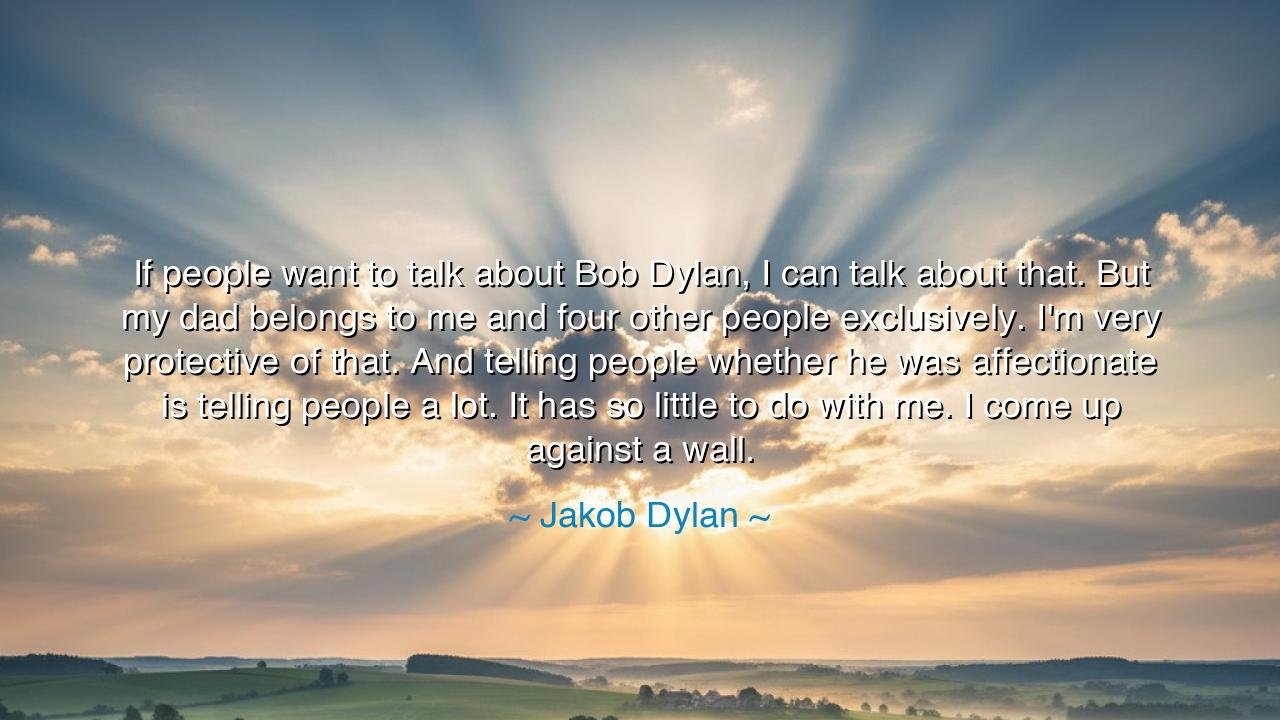
If people want to talk about Bob Dylan, I can talk about that.
If people want to talk about Bob Dylan, I can talk about that. But my dad belongs to me and four other people exclusively. I'm very protective of that. And telling people whether he was affectionate is telling people a lot. It has so little to do with me. I come up against a wall.






In the words of Jakob Dylan, “If people want to talk about Bob Dylan, I can talk about that. But my dad belongs to me and four other people exclusively. I'm very protective of that. And telling people whether he was affectionate is telling people a lot. It has so little to do with me. I come up against a wall.” These words rise from a place both tender and resolute — a son’s voice, weighed with reverence, setting a sacred boundary around the private heart of family. Beneath the calm restraint of Jakob’s tone, there burns a powerful truth: that fame may belong to the world, but love belongs to the few. In a time when the personal is consumed by the public, his words stand as a defense of the holy — the bond between child and parent, shielded from the eyes of those who mistake curiosity for entitlement.
The origin of this quote lies in Jakob Dylan’s lifelong experience as the son of one of the most revered and mythologized figures in modern music, Bob Dylan. From birth, he was surrounded by the immense shadow of genius — a father not merely a man, but a legend, a name whispered with awe by millions. Yet in the midst of that global reverence, Jakob and his siblings knew another man, quieter, more human, whose love, distance, or warmth belonged only to them. The younger Dylan’s words reveal the tension between these two worlds: the public icon and the private father. He acknowledges that the world has a claim to the artist, but the man — his gestures, his tenderness, his imperfections — belongs to his children alone.
When he says, “My dad belongs to me and four other people exclusively,” he draws a sacred circle — the circle of family — around what is real and inviolable. In an age where the famous are dissected endlessly by strangers, Jakob’s refusal to unveil his father’s private life is not coldness, but protection. It is an act of love, not secrecy. For what is love if not the right to hold a part of another being that the world can never touch? His words remind us that not everything that is known must be shared, and not every truth is meant for the crowd. There is dignity in silence, and there is love in restraint.
The ancient philosophers would have recognized Jakob’s sentiment. Marcus Aurelius, the Roman emperor and Stoic thinker, once said that the soul must “withdraw into itself” to find peace, and that the inner life is not for spectacle but for truth. So too does Jakob withdraw — not out of pride, but out of respect. Just as temples veil their altars, so does he veil his father’s humanity, preserving its sanctity. For he knows that when something sacred is exposed to the gaze of many, it loses its mystery, its warmth, and its essence. Privacy is the final fortress of the soul, and to defend it is not selfishness, but wisdom.
When Jakob admits, “Telling people whether he was affectionate is telling people a lot,” he reveals how fragile and intimate such truths are. Affection, or its absence, is not a detail of gossip — it is the language of the heart. To speak of it publicly would be to hand over the most personal of emotions to those who cannot comprehend their weight. It is not cruelty that makes him silent; it is reverence. He knows that the relationship between a father and son is a sacred conversation, written not in words but in gestures, glances, and moments that cannot be translated for an audience. His “wall” is not a barrier of bitterness, but a wall of protection — like the walls of an ancient city, preserving what is most precious within.
History, too, echoes his sentiment. Consider Hannah Arendt, the philosopher who wrote of the “banality of evil” and the erosion of the private self in the face of public scrutiny. She warned that when the intimate realm of life — family, friendship, affection — becomes public property, the human spirit loses its depth. Jakob Dylan, perhaps unknowingly, carries this same torch of understanding. By drawing the line between his father’s fame and his father’s love, he defends not only his own peace, but the very principle that the human heart must have a place beyond the reach of the world.
The lesson, then, is one of balance and sacred boundaries. In a world obsessed with revelation, where every soul is tempted to display itself for validation, we must remember that some truths grow only in silence. Protect the sanctuaries of your heart — your family, your love, your grief — for they are the roots of your being. Share your gifts with the world, but guard your intimacies as treasures. The wise know that not all things sacred must be spoken; some must be kept, like fire in the hearth, burning unseen but giving warmth to those within.
So, my children of the present age, heed the wisdom of Jakob Dylan: let the world know your work, but not your soul. Give them your art, your craft, your light — but keep for yourself the private music of your heart. For when you learn to cherish what is yours alone, you preserve the dignity of life itself. And in that quiet strength, you will find peace — not in the noise of fame, but in the stillness of love protected.






AAdministratorAdministrator
Welcome, honored guests. Please leave a comment, we will respond soon